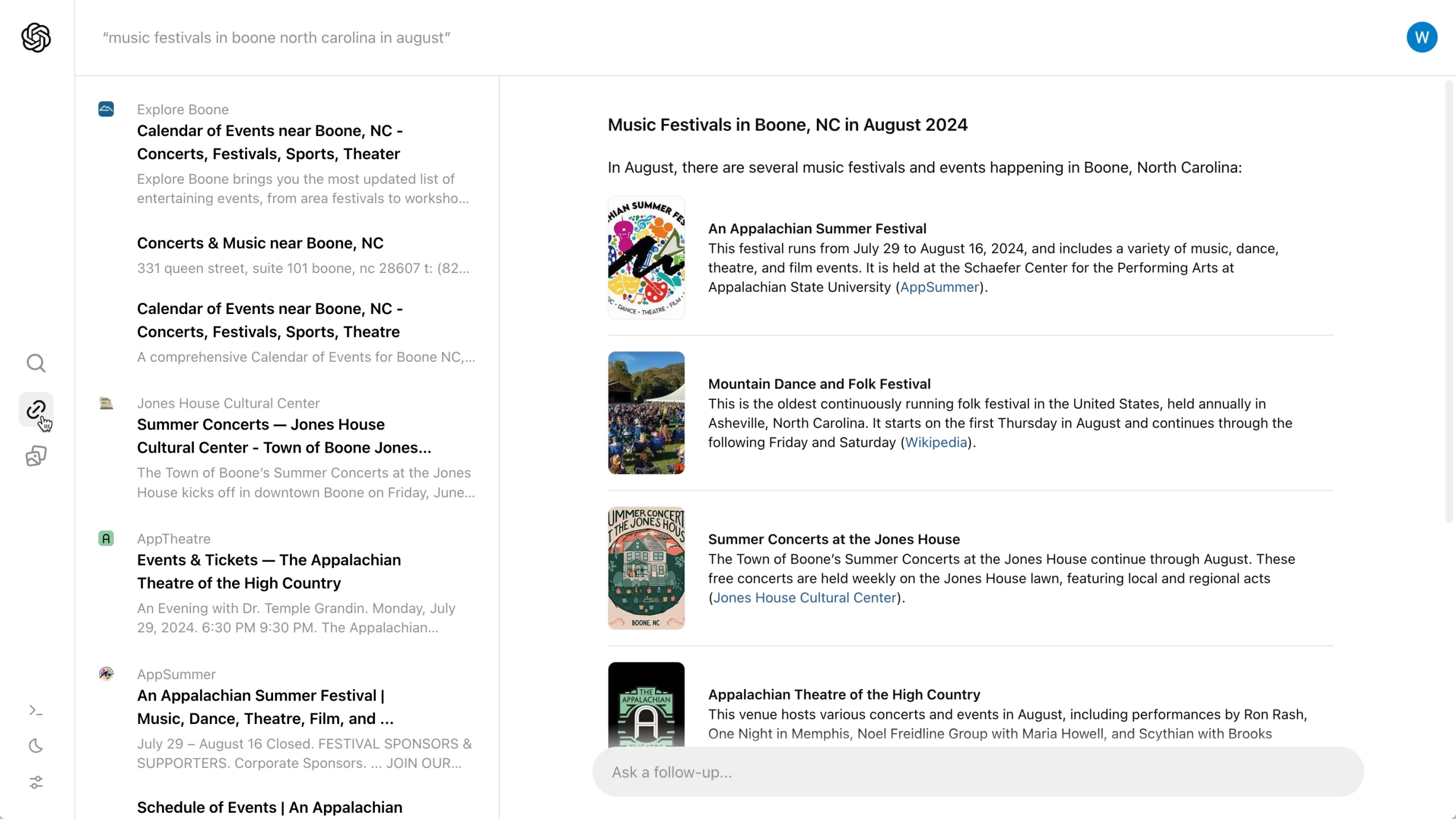SearchGPT Optimization Services
Big changes are coming. OpenAI’s new search engine, SearchGPT, is set to shake up how businesses connect with customers online. It’s not just another search tool—it’s smarter, faster, and more conversational. If you’re not preparing now, someone else will take your spot.
This is your chance to get ahead.
On This Page
Why You Need to Be Ready for SearchGPT
OpenAI’s SearchGPT combines the best parts of a search engine with advanced natural language processing (NLP), so the interaction feels way more intuitive. Instead of just seeing a bunch of links, you get rich, human-like responses. It’s a big step toward improving the overall user experience in search.
I’ve been in the SEO game for years, seeing how AI has evolved.
Be ready to optimize your site for SearchGPT? Let’s get you started.

So, What’s SearchGPT?
SearchGPT is OpenAI’s latest venture into search, and it’s built to deliver answers, not just links. It understands your questions in a more human way, giving you the answers you need, fast.
Think of it as combining the best of a search engine with AI that understands context. It’s not going to throw pages of links at you—it’s about quick, relevant responses that take you straight to the point.
Will SEO Still Matter with SearchGPT?
Yes! SEO is still going to be critical, even with this new AI-driven engine. Like Google, SearchGPT will rely on optimized content to sort through massive amounts of data.
If you’ve been optimizing for Google’s Search Generative Experience (SGE), you’ve got a head start. Many of the strategies will overlap, but expect some tweaks. As SearchGPT develops, so will the SEO tactics, and staying ahead will make all the difference.
Optimizing for SearchGPT
Search is Becoming More Conversational
With SearchGPT, searching will feel more like chatting.
Users will ask follow-up questions and get fast, precise answers, which means content creators need to craft clear, conversational responses that answer specific questions directly.
The Role of Keywords, Entities, and Search Intent
Keywords still matter, but they need to fit seamlessly into your content, especially with the rise of voice search. Using context—through entities—helps SearchGPT understand your content better, improving your ranking.
Understanding search intent is just as important; matching your content to what users are actually looking for enhances their experience and boosts visibility.
Leveraging Rich Media & Structured Data
Content with rich media—videos, images, and structured data—will likely rank higher in AI-driven searches.
Incorporating these elements makes your site more attractive to SearchGPT, and structured data (like schema markup) helps algorithms better grasp your content’s context.
Content is King, Driven By E-E-A-T
No matter how advanced search gets, quality content remains crucial. AI will prioritize well-researched, user-friendly content that aligns with SEO principles like Experience, Expertise, Authoritativeness, and Trustworthiness (E-E-A-T).
In areas like finance or health, showcasing your expertise will help your SearchGPT apperance.
New Metrics for a Conversational Search World
As search becomes more interactive, traditional metrics like click-through rates might lose relevance.
Marketers will need to focus on engagement, bounce rates, and conversions—metrics that better reflect how users interact with conversational search.
Best SearchGPT SEO Agency
Looking to leverage AI-powered search to your advantage?
StudioHawk is a leading expert in SearchGPT SEO, empowering businesses to enhance their online visibility and connect with their target audience through smart, user-centric strategies:
- Conversational Content – Crafting responses that match AI search behaviour, providing users with clear and useful information.
- Data-Driven Insights – Tracking search trends to fine-tune content and keep your SEO strategy current.
- Structured Data Optimisation – Using schema markup to help search engines interpret and rank your content accurately.
- AI Chat Integration – Creating smart chat solutions that engage visitors and offer instant support.
At StudioHawk, we focus on precise content and smart strategies that help businesses stay visible and competitive.
How SEO Will Adapt to SearchGPT
As SearchGPT rolls out, SEO strategies will need to evolve. Focus on building your “digital shelf” by developing a strong online presence across the web.
Your content needs to be clear, concise, and user-focused. SearchGPT is all about direct answers, so your content needs to be punchy and on-point.
Keeping up with SEO trends is going to be crucial. Trust and credibility, through E-E-A-T, will keep your SEO game strong.





